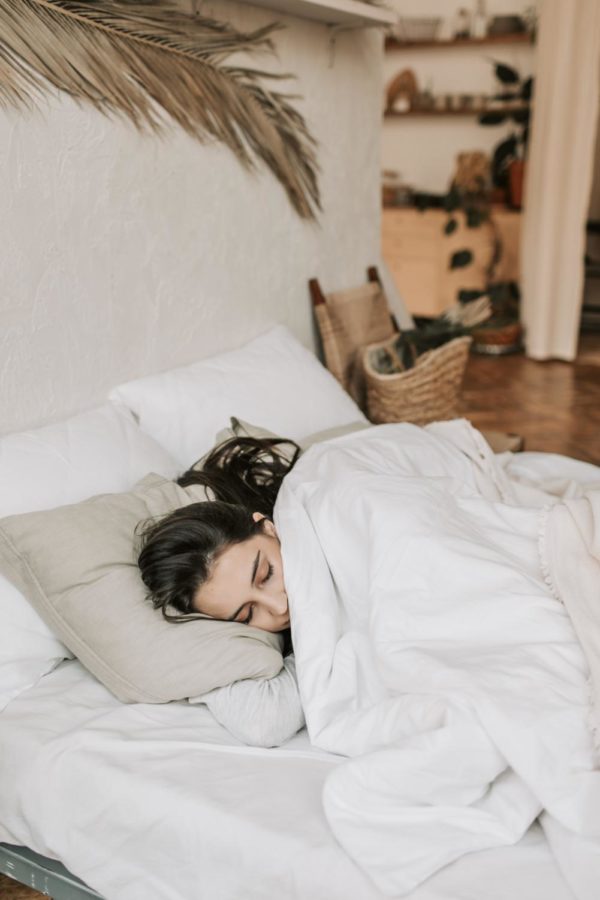Students Need Improved Sleep and It May Be Easier Than Expected To Accomplish
September 21, 2022
In addition to “Walking Wednesdays”, you can do a variety of sports, use gym equipment, or go rock climbing in the Physical Education Complex (PEC) on campus. Doing yoga on Mondays and Wednesdays in the PEC’s Studio 1 from 1:45 to 2:45 p.m. is an option, but that has the same problem of finding time and self-determination.
According to Russoniello, O’Brien, & Parks, in a paper titled “The Effectiveness of Casual Video Games in Improving Mood and Decreasing Stress,” casual video games have great potential to increase mood, allow heart rate to vary, and relax the autonomic nervous system. Thus, playing casual video games on a dedicated console is a good stress reduction technique for some people, but that may lead to procrastination of your aforementioned stressors and obligations, such as homework. Thus, you may spiral into more unwanted stress. Perhaps watching Netflix or YouTube could help to reduce stress, but that could lead you down an endless rabbit hole of incessant and weird videos. It would be fantastic to be able to reduce stress with an activity that we, as humans, must do. There actually is!
Enhancing sleep is one promising way to reduce stress. Humans need at least eight hours of sleep, but falling asleep and/or staying asleep may be an underlying issue. You may be wondering what I’m referring to when I say ‘sleep enhancement.’ I could be referring to the mattress, mechanics under the bed, pillows, sheets, blankets, taking melatonin supplements, or an eating or drinking ritual before bedtime…. The list goes on and on. Over-the-counter drugs like melatonin may work, but ingested chemicals may very well have unknown side effects on various users. Thus, taking melatonin may be risky and may require a consultation with a physician.
Chemical changes have their unknown set of risks, so a physical change is one worth considering. Changing your nightly blanket to a weighted blanket has the great potential to reduce stress and make your sleep surprisingly efficient and relaxing. I was both very skeptical and a little bit intrigued about weighted blankets when I heard about it for the first time three years ago. I heard the basic information about it on the internet, such as ‘it feels like being hugged’. I was curious about it back then, but I did not think much of it and carried on in life.
In the past month, I reflected on several aspects of my life to see what activity can be improved in my life. I realized that for the most part I was an insomniac. I only slept when I actually felt excessively tired or sleepy. I slept to just get it over with, so I can resume my daily activities. I always felt like sleep was a nuisance activity and just needed to get done.
According to researchers at the Scandinavian Journal of Occupational Therapy in a paper titled “The effectiveness of weighted blankets on sleep and everyday activities…,” 59% of 85 participants with attention, hyperactivity, and/or autistic traits were able to fall asleep sooner and stay asleep longer due to their use of a weighted blanket.
In the same scientific article, it was found that while there are other variables that may improve sleep in addition to a deep-pressure stimulating blanket, 80% of these research participants made the decision to continue using the blanket for up to three years due to an overall positive experience. Another team of researchers at the same journal investigated weighted blankets further.
According to Odéus et al. in a paper titled “Weighted blankets for sleep problems – prescription, use and cost analysis,” the researchers discovered that the participants retained the deep-pressure stimulating blanket for longer periods of time. Furthermore, each participant had one of several diagnoses, which were dementia, anxiety, autism, or intellectual disability. The research does not dismiss the plausibility that weighted blankets may serve beneficial to the neurotypical population of people as well.
Weighted blankets offer very low risk of negative consequences and a low cost of attaining a weighted blanket. After learning about scientific evidence, people are usually reluctant to try an intervention unless it directly applies to their specific impediment, but if the risks are low enough with a desired minimal amount of plausible benefit, it may actually be worth intervening and trying the intervention.
The conducted research may not have been tested on neurotypical individuals, but there may be sufficient evidence to use a weighted blanket for NEIU students to gain plausible benefits, especially among the insomniacs on campus.
After evaluating the scientific research for myself, I decided to purchase a weighted blanket in accordance with the general recommendations of the blanket being ten percent of my body weight. Most weighted blankets range from $50 to $100, so they are reasonably affordable.
The internet gossip about weighted blankets aligned with my personal experience. It did feel like being hugged. The blanket tucked itself into my sides to prevent undesired movement upon sleeping. The blanket matched the contour of my body seamlessly.
My personal experience aligned with the aforementioned scientific research as well. I fell asleep within minutes instead of the usual hour. I stayed asleep throughout the entire night for the full eight hours instead of awakening and struggling to fall asleep. I woke up without the need for an alarm after my eight hours of sleep. Upon waking up, I felt satisfied, refreshed, and ready to conquer the day. Most surprisingly, I have actually looked forward to sleeping with my weighted blanket upon nightfall.
As you can see, there are a myriad of ways to combat stress, and it is imperative for you to self-reflect and discover which way is most likely to work best for you. It is crucial to use the critical thinking skills learned from classes to figure it out.
The university has a variety of services to help students, and sometimes those campus resources are sufficient to help persuade people to make decisions that improve their habits and behaviors. Scientific research often suggests and supports certain practices that have worked for people alike or different to oneself, and sometimes scientific research is necessary and adequate to persuade people to improve their habits and behaviors.
Other times, an anecdote from a fellow campus community member is enough to persuade people to consider engaging and improving their habits and behaviors. Ultimately, it is each student’s decision to get the necessary help to reduce their stress and succeed in school, work, life, and beyond.
External Sources:
Baric, V.B., Skuthälla, S., Pettersson, M., Gustafsson, P.A., & Kjellberg, A. (2021). The effectiveness of weighted blankets on sleep and everyday activities – A retrospective follow-up study of children and adults with attention deficit hyperactivity disorder and/or autism spectrum disorder. Scandinavian Journal of Occupational Therapy, 1-11. https://doi.org/10.1080/11038128.2021.1939414
Odéus, E., Pauli, E., Steingrímsson, S., Cederlund, M., Franzén, S., Helgesson, C., Nyström, K., Sondell, J., & Opheim, A. (2022). Weighted blankets for sleep problems – prescription, use and cost analysis. Scandinavian Journal of Occupational Therapy, 1-11. https://doi.org/10.1080/11038128.2022.2066017
Russoniello, C.V., O’Brien, K., & Parks, J.M. (2009). The Effectiveness of Casual Video Games in Improving Mood and Decreasing Stress. Journal of CyberTherapy & Rehabilitation, 2(1), 53-66.











